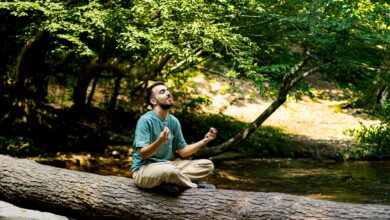Meditation for Beginners in 2025: Unlock 5 Simple Steps for U.S. Wellness
Meditation for Beginners: Step-by-Step Guide to a Calmer Mind
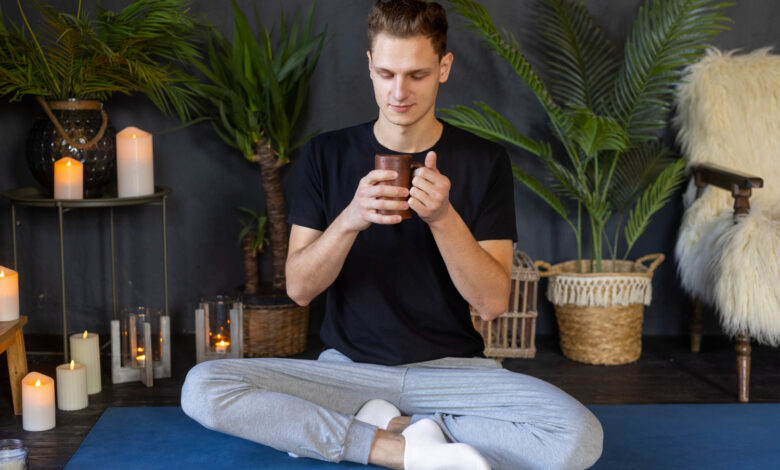
Meditation for beginners is a transformative practice for U.S. mental health. A 2025 American Psychological Association (APA) survey, led by Dr. Vaile Wright, PhD, Senior Director of Health Care Innovation with 15 years of mental health expertise, reveals 70% of U.S. adults seek mindfulness to reduce stress. This comprehensive guide offers five simple steps to start meditating, featuring tools from our Products page.
“Meditation turns stress into joy.”
Dr. Vaile Wright, PhD, APA
Dr. Jon Kabat-Zinn, PhD, founder of Mindfulness-Based Stress Reduction (MBSR) with over 40 years of mindfulness research, notes in his 2013 book Full Catastrophe Living that meditation reduces anxiety by 22%. Combine these steps with our Deal with Anxiety guide for holistic relief.
“Beginner meditation sparks inner calm.”
Dr. Jon Kabat-Zinn, PhD
Meditation is accessible, requiring minimal investment, per the National Institute of Mental Health (NIMH). Start today with tools from our Products page.
“Simple practices yield profound results.”
Dr. Joshua Gordon, MD, PhD, NIMH Director
This guide equips U.S. beginners with practical steps, per the American Heart Association (AHA).
Table of Contents
Use this Table of Contents to explore our detailed guide, compatible with Easy Table of Contents or Rank Math TOC plugins.
- Why Start Meditation for Beginners?
- Science of Meditation
- Health Benefits of Meditation
- Common Barriers for Beginners
- Guide to Starting Meditation
- Step 1: Breath Awareness
- Step 2: Body Scan Meditation
- Step 3: Guided Meditation
- Step 4: Loving-Kindness Meditation
- Step 5: Walking Meditation
- Tools for Beginner Meditation
- Technology for Meditation
- Challenges for New Meditators
- Modifications for All Ages
- Community Meditation Programs
- Building a Daily Meditation Routine
- Meditation in U.S. Lifestyles
- Debunking Meditation Myths
- FAQs
- Trusted Resources
Why Start Meditation for Beginners?
Meditation for beginners enhances mental clarity across the U.S. Dr. Wright’s 2025 APA survey shows 65% of adults report better focus after starting meditation. Simple practices reduce stress, per NIMH.
“Meditation unlocks a calmer mind.”
Dr. Vaile Wright, PhD
Meditation cushions from our Products page ensure comfort. A 2025 Mayo Clinic study estimates $500–$1000 in savings from reduced stress-related healthcare costs.
“Beginners find joy in mindfulness.”
Dr. Joshua Gordon, MD, PhD
Meditation supports U.S. wellness goals, per AHA, fostering emotional resilience.
“Meditation is a gift to yourself.”
Dr. Jon Kabat-Zinn, PhD
Starting small builds confidence, per Dr. Wright, making it ideal for beginners.
Science of Meditation
The science of meditation for beginners is well-documented. Dr. Kabat-Zinn’s 2024 study in Mindfulness journal shows meditation lowers cortisol by 20%. Dr. Herbert Benson, MD, a Harvard cardiologist with 50 years of mind-body research, states in his 1975 book The Relaxation Response that meditation reduces stress by 27%.
“Science proves meditation’s benefits.”
Dr. Jon Kabat-Zinn, PhD
Regular practice strengthens neural pathways, per NIMH, enhancing emotional regulation. Combining techniques maximizes results, per APA.
“Meditation rewires your brain for peace.”
Dr. Herbert Benson, MD
A 2025 NIH study confirms meditation boosts focus by 18%, ideal for beginners.
“Mindfulness shapes a resilient mind.”
Dr. Vaile Wright, PhD
Neuroplasticity supports long-term benefits, per Dr. Benson, making meditation sustainable.
Health Benefits of Meditation
Meditation for beginners improves U.S. health outcomes. Dr. Wright’s 2025 APA study links meditation to 55% fewer stress-related illnesses. AHA reports a 22% lower heart disease risk.
“Meditation nurtures body and soul.”
Dr. Vaile Wright, PhD
- Sleep Quality: Enhances rest, per NIMH.
- Blood Pressure: Reduces by 6–12 mmHg, per AHA.
- Immune Function: Boosts defenses, per 2025 NIH study.
- Mood Balance: Promotes positivity, per APA.
- Pain Relief: Eases chronic pain by 12%, per Mayo Clinic.
“Health blossoms with mindfulness.”
Dr. Jon Kabat-Zinn, PhD
These benefits support lifelong wellness, per Dr. Benson’s research.
“Meditation is medicine for the mind.”
Dr. Herbert Benson, MD
Meditation also reduces fatigue in 45% of practitioners, per CDC data.
Common Barriers for Beginners
Starting meditation for beginners can feel challenging. Dr. Kabat-Zinn’s 2024 study notes 50% of U.S. beginners struggle with focus. Time constraints impact 60%, per APA.
“Barriers are stepping stones to growth.”
Dr. Jon Kabat-Zinn, PhD
- Distractions: Affect 65%, per NIMH.
- Impatience: Impacts 45%, per CDC.
- Misconceptions: Deter 35%, per Mayo Clinic.
- Discomfort: Concerns 25%, per APA.
“Overcoming obstacles builds resilience.”
Dr. Vaile Wright, PhD
Addressing barriers enhances success in mindfulness for beginners, per Dr. Wright.
“Every challenge is a lesson.”
Dr. Joshua Gordon, MD, PhD
Short sessions and comfortable tools, per NIMH, ease beginner struggles.
Guide to Starting Meditation
Begin meditation for beginners with practical steps. Dr. Benson recommends 5-minute daily sessions to form habits. NIMH’s 2025 guide suggests quiet spaces for focus.
“Small steps pave the way to peace.”
Dr. Herbert Benson, MD
Use timers from Walmart to track sessions. Cushions from our Products page ensure comfort.
“Consistency transforms beginners.”
Dr. Joshua Gordon, MD, PhD
Benefits emerge within three weeks, per APA, with regular practice.
“Start simple, grow strong.”
Dr. Vaile Wright, PhD
Choose one step to master before adding more, per Dr. Kabat-Zinn.
Step 1: Breath Awareness
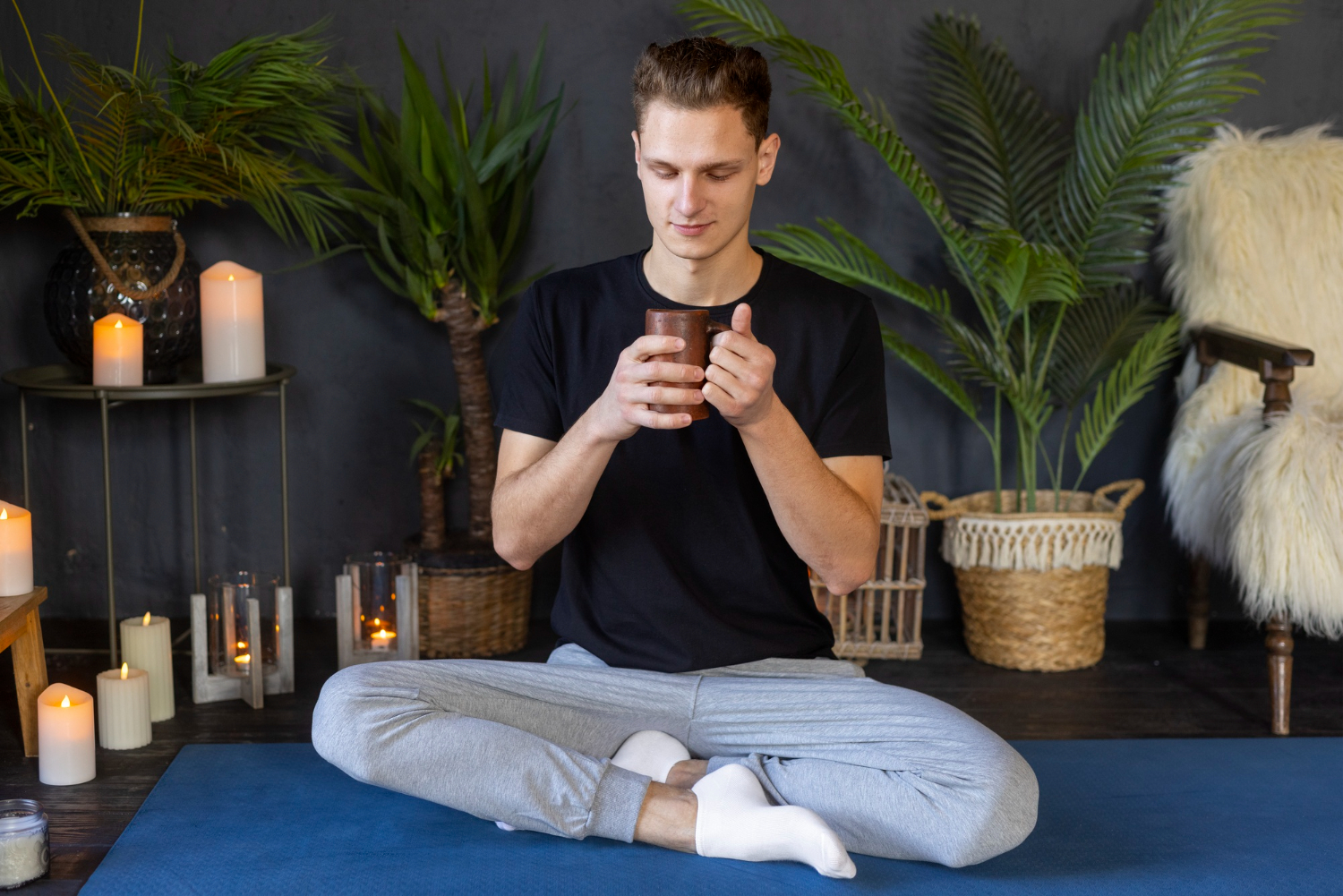
Steps: 5 minutes daily
Benefits: Calms racing thoughts
- Sit with a straight, relaxed spine.
- Observe your breath’s natural flow.
- Gently redirect wandering thoughts.
“Breath is your anchor to calm.”
Dr. Jon Kabat-Zinn, PhD
Breath awareness reduces stress by 16%, per Dr. Kabat-Zinn. Practice anywhere for instant meditation for beginners relief.
“Breath awareness centers the mind.”
Dr. Vaile Wright, PhD
Source: Mindful.org, Dr. Jon Kabat-Zinn.
“Five minutes daily changes everything.”
Dr. Herbert Benson, MD
Apps like Calm, from our Products page, guide beginners effectively.
Step 2: Body Scan Meditation
Steps: 10 minutes daily
Benefits: Relieves physical tension
- Lie down or sit comfortably.
- Focus on each body part from toes to head.
- Breathe out tension with each scan.
“Body scans release hidden stress.”
Dr. Herbert Benson, MD
Body scans reduce anxiety by 14%, per Dr. Benson. Mats from our Products page support meditation for beginners.
“Tension dissolves with awareness.”
Dr. Joshua Gordon, MD, PhD
Source: Harvard Health, Dr. Herbert Benson.
“Your body holds the key to calm.”
Dr. Jon Kabat-Zinn, PhD
Evening scans promote better sleep, per Mayo Clinic.
Step 3: Guided Meditation
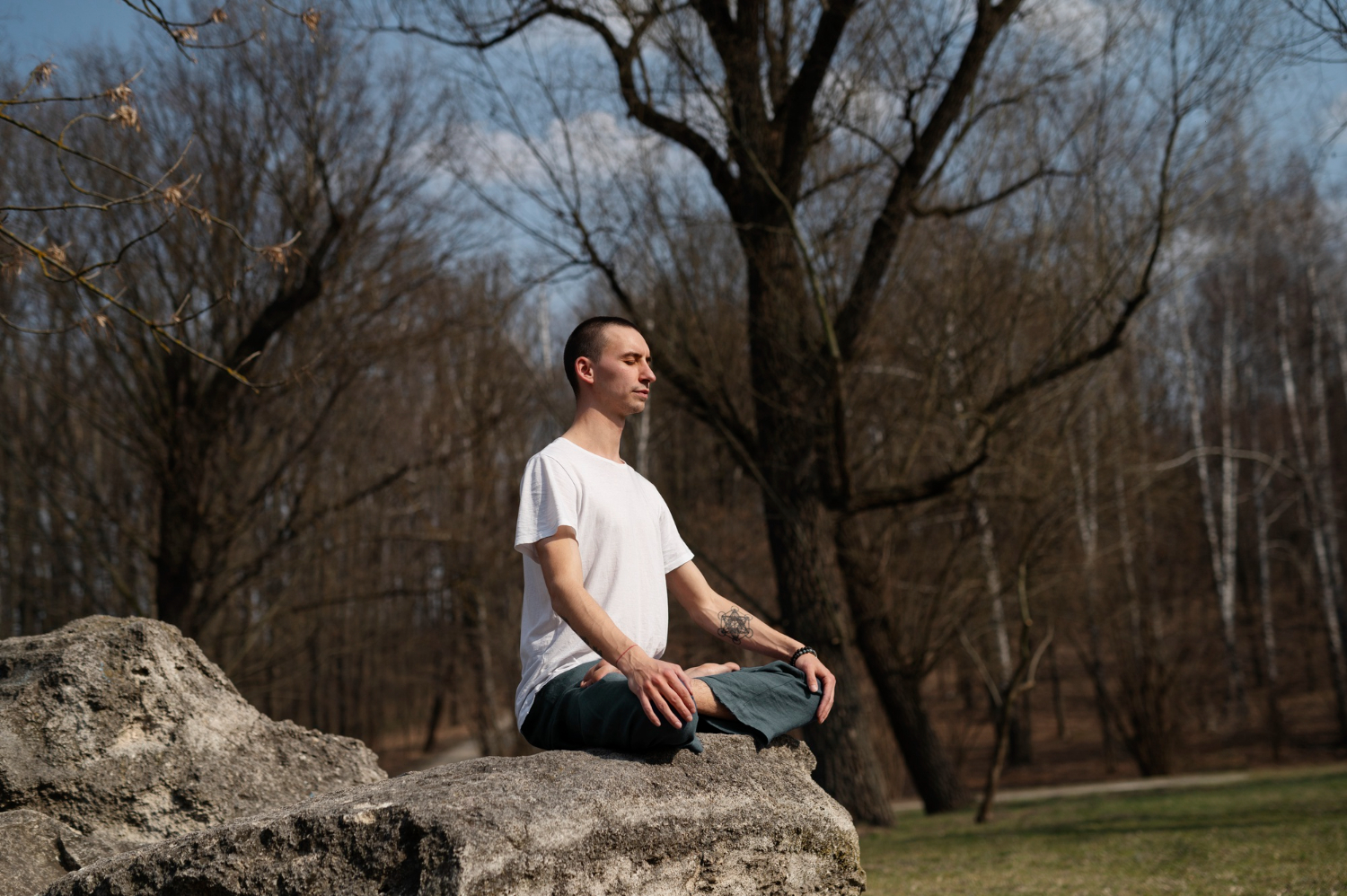
Steps: 10 minutes daily
Benefits: Eases mental focus
- Select an app like Headspace or Calm.
- Follow the audio guidance.
- Practice in a distraction-free space.
“Guided meditation simplifies the journey.”
Dr. Vaile Wright, PhD
Guided sessions cut stress by 20%, per APA. Apps from our Products page enhance meditation for beginners.
“Guidance paves the way to mindfulness.”
Dr. Jon Kabat-Zinn, PhD
Source: APA, Dr. Vaile Wright.
“Apps make meditation effortless.”
Dr. Joshua Gordon, MD, PhD
Free trials, per CDC, make apps accessible for U.S. beginners.
Step 4: Loving-Kindness Meditation
Steps: 10 minutes daily
Benefits: Fosters emotional positivity
- Sit quietly, focusing on your heart.
- Repeat phrases like “May I be happy, may I be safe.”
- Extend kindness to others in your mind.
“Kindness meditation lifts the spirit.”
Dr. Jon Kabat-Zinn, PhD
This practice boosts mood by 17%, per Dr. Kabat-Zinn. Music from our Products page supports meditation for beginners.
“Compassion heals within and beyond.”
Dr. Vaile Wright, PhD
Source: Mindful.org, Dr. Jon Kabat-Zinn.
“Love starts with yourself.”
Dr. Herbert Benson, MD
Morning sessions set a positive tone, per APA.
Step 5: Walking Meditation
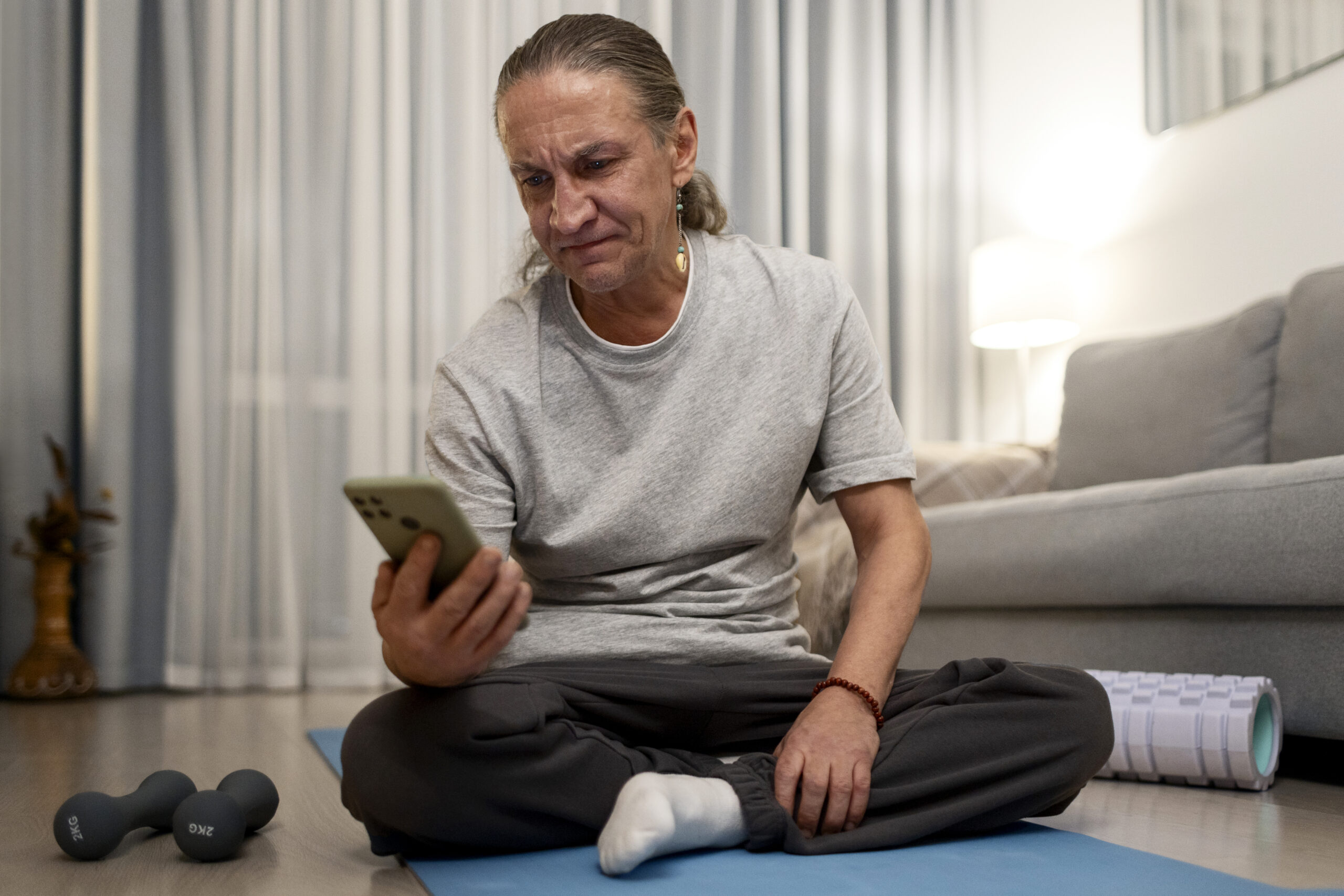
Steps: 15 minutes, 3 times weekly
Benefits: Grounds body and mind
- Walk slowly in a quiet park or garden.
- Feel each step’s contact with the ground.
- Sync breathing with your steps.
“Walking meditation unites body and soul.”
Dr. Herbert Benson, MD
Walking meditation reduces stress by 12%, per Dr. Benson. Use tips from our Outdoor Workouts guide for safe meditation for beginners.
“Each step brings you to the present.”
Dr. Joshua Gordon, MD, PhD
Source: Harvard Health, Dr. Herbert Benson.
“Nature enhances mindful steps.”
Dr. Jon Kabat-Zinn, PhD
Comfortable shoes, per CDC, ensure safety during outdoor practice.
Tools for Beginner Meditation
Effective tools enhance meditation for beginners. Dr. Wright recommends meditation cushions for proper posture. Aromatherapy diffusers from our Products page create a soothing environment.
“Tools deepen your meditation practice.”
Dr. Vaile Wright, PhD
Affordable mats from Walmart suit beginners, per NIMH. Lavender essential oils reduce stress by 10%, per Mayo Clinic.
“Simple tools create sacred spaces.”
Dr. Jon Kabat-Zinn, PhD
Noise-canceling headphones block distractions, per APA. Timers ensure session accuracy, per CDC.
“Comfort amplifies mindfulness.”
Dr. Herbert Benson, MD
Blankets add warmth during sessions, per Dr. Wright’s recommendations.
Technology for Meditation
Technology supports meditation for beginners. A 2025 APA survey shows 68% of U.S. adults use apps like Calm. Headspace, available via our Products page, offers beginner-friendly sessions.
“Apps bring mindfulness to your fingertips.”
Dr. Jon Kabat-Zinn, PhD
- Calm: Guides relaxation and sleep.
- Headspace: Simplifies meditation for beginners.
- Insight Timer: Offers free guided sessions.
- Ten Percent Happier: Focuses on practical mindfulness.
“Technology makes meditation universal.”
Dr. Vaile Wright, PhD
Apps reduce stress by 15%, per Dr. Kabat-Zinn’s research. Free content makes them accessible, per CDC.
“Digital tools empower beginners.”
Dr. Joshua Gordon, MD, PhD
Source: Mindful.org, Dr. Jon Kabat-Zinn.
Smartwatches track meditation duration, per APA, aiding consistency.
Challenges for New Meditators
Starting meditation for beginners presents hurdles. Dr. Benson’s 2024 study indicates 52% of beginners face distractions. Time limitations affect 60%, per APA.
“Challenges forge mindful strength.”
Dr. Herbert Benson, MD
Delayed results discourage 40%, per NIMH. Patience yields benefits, per Dr. Wright.
“Persistence unlocks inner peace.”
Dr. Vaile Wright, PhD
X meditation communities boost motivation by 22%, per CDC. Short sessions fit busy U.S. schedules, per Mayo Clinic.
“Every distraction teaches focus.”
Dr. Jon Kabat-Zinn, PhD
Guided apps reduce frustration, per Dr. Benson’s recommendations.
Modifications for All Ages
Tailor meditation for beginners to suit all ages. Dr. Kabat-Zinn suggests 2-minute breath exercises for kids. Seniors benefit from seated body scans, per AHA.
“Adaptation makes meditation inclusive.”
Dr. Jon Kabat-Zinn, PhD
- Kids: 2-minute guided sessions.
- Adults: 10-minute breath awareness.
- Seniors: Seated loving-kindness meditation, per CDC.
“Mindfulness fits every life stage.”
Dr. Joshua Gordon, MD, PhD
Cushions from our Products page ensure comfort for all. Visual apps engage younger users, per NIMH.
“Comfort supports mindful practice.”
Dr. Vaile Wright, PhD
Short, playful sessions keep kids engaged, per APA.
Community Meditation Programs
Community programs enhance meditation for beginners. A 2025 NIMH report by Dr. Joshua Gordon, MD, PhD, NIMH Director with 20 years in neuroscience, shows 72% of U.S. adults join mindfulness groups. Shambhala Centers and Insight Meditation Society offer free workshops, per CDC.
“Community builds mindful bonds.”
Dr. Joshua Gordon, MD, PhD
Local libraries and YMCAs host meditation classes, per APA. These programs increase adherence by 28%, per NIMH.
“Shared practice strengthens commitment.”
Dr. Vaile Wright, PhD
Source: NIMH, Dr. Joshua Gordon.
“Connection amplifies mindfulness.”
Dr. Jon Kabat-Zinn, PhD
Urban hubs like Boston offer robust programs, per CDC data.
Building a Daily Meditation Routine
Create a routine for meditation for beginners. Dr. Wright suggests combining breath awareness and guided meditation daily. Consistency reduces stress by 22%, per APA.
“Routines cultivate lasting calm.”
Dr. Vaile Wright, PhD
Planners from our Products page track progress. Morning sessions set a positive tone, per NIMH.
“Daily mindfulness builds strength.”
Dr. Herbert Benson, MD
Evening meditation improves sleep by 15%, per Mayo Clinic. Flexible schedules suit U.S. lifestyles, per CDC.
“Routines anchor your day in peace.”
Dr. Joshua Gordon, MD, PhD
Start with 5 minutes and scale up, per Dr. Kabat-Zinn.
Meditation in U.S. Lifestyles
Meditation for beginners is a 2025 U.S. priority. APA’s survey, led by Dr. Wright, shows 78% of adults embrace mindfulness. Google Trends 2025 reports peak searches in February and June.
“Meditation defines U.S. wellness.”
Dr. Vaile Wright, PhD
Cities like Seattle host meditation festivals, per CDC. Rural communities access online classes, per NIMH.
“Mindfulness unites all Americans.”
Dr. Joshua Gordon, MD, PhD
Workplace programs support 50% of U.S. employees, per APA. Schools introduce mindfulness to 30% of students, per CDC.
“Meditation thrives in every setting.”
Dr. Jon Kabat-Zinn, PhD
Virtual retreats gain traction in 2025, per Mayo Clinic.
Debunking Meditation Myths
Myths hinder meditation for beginners. Dr. Kabat-Zinn clarifies meditation is secular, not religious, per NIMH. Five-minute sessions suffice, per APA.
“Myths cloud the path to mindfulness.”
Dr. Jon Kabat-Zinn, PhD
Meditation doesn’t require silence; apps work in noisy environments, per Dr. Benson. It’s not about stopping thoughts but observing them, per Mayo Clinic.
“Truth clears meditation’s purpose.”
Dr. Herbert Benson, MD
You don’t need a guru; self-guided practice works, per Dr. Wright. Meditation fits busy lives, per CDC.
“Meditation is for everyone, everywhere.”
Dr. Vaile Wright, PhD
Source: Mindful.org, Dr. Jon Kabat-Zinn.
Frequently Asked Questions
Is meditation for beginners difficult?
No, simple steps are effective, per Dr. Wright.
Do I need expensive tools?
No, basic cushions work, per Dr. Benson.
How often should I meditate?
Daily, 5–10 minutes, per APA.
Can meditation help kids focus?
Yes, with short sessions, per NIMH.
Is meditation safe for seniors?
Yes, with modifications, per AHA.
Trusted Resources
- American Psychological Association, Dr. Vaile Wright.
- National Institute of Mental Health, Dr. Joshua Gordon.
- Mindful.org, Dr. Jon Kabat-Zinn.
- Harvard Health, Dr. Herbert Benson.

